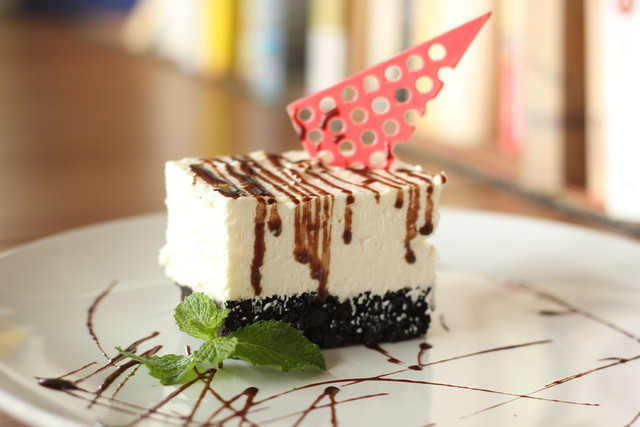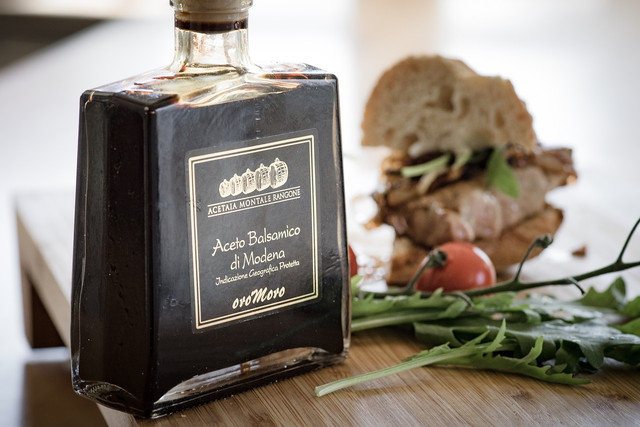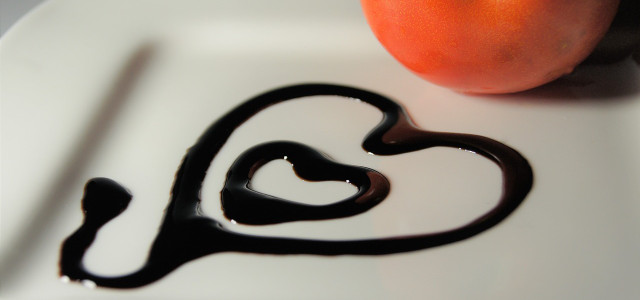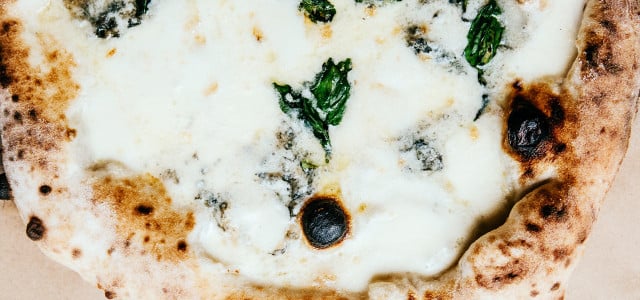The beauty of making this elegant balsamic glaze reduction recipe is that it only requires one ingredient: balsamic vinegar. We’ll show you how to easily make it yourself.
A balsamic glaze reduction can be created simply at home to add elegance and unique flavor to your dishes. Turning balsamic vinegar into a reduction will result in a thicker sauce and concentrate the sugars in the reduction, making it a sweet yet tangy and complex glaze for many recipes.
Be sure to follow the recipe with precision and don’t rush, because this delicate reduction can burn easily near the end. Keep reading to learn how to make this balsamic glaze reduction and how to use it.
Balsamic Glaze Reduction: DIY Recipe
- In a small saucepan, bring a 3/4 cup of balsamic vinegar to a low boil over medium heat. Reduce the heat slightly (medium low or low) to a simmer so that small bubbles form around the sides and center of the pot – but should not be a full boil.
- Continue cooking until the balsamic vinegar has reduced by about half (about 15 to 20 minutes). The reduction should leave a thin film on the bottom of the pan when tipped to the side. Be sure to watch carefully near the end so the balsamic glaze reduction doesn’t burn.
- Pour your balsamic glaze reduction in a serving dish to cool. It will continue to thicken into a caramel syrup-like consistency. Set aside for serving.
The balsamic glaze reduction can be stored in an air-tight container and refrigerated for 1 to 2 days. Reheat on the stovetop over medium heat to serve again. It is not freezer-friendly.
This recipe can be adjusted for the amount of balsamic glaze reduction needed. The balsamic glaze reduction will result in about half the amount of liquid you originally started with. If you need 3/4 of a cup, start with simmering 1 1/2 cups of balsamic vinegar, if you need 1 cup of the glaze, begin with 2 cups of vinegar, etc.
What Can You Use it For?

Try this balsamic glaze reduction on foods that are salty and savory or sweet dishes.
- The basamic reduction can be used as a topping for veggie dishes like brussel sprouts, roasted potatoes, salads, and more.
- You can use it with antipasti, topping it on vegan cheese, breads and crackers, pickled vegetables, etc.
- Try it on pasta with homemade pesto, pizza, or as a garnish for soup.
- Balsamic also pairs beautifully with fruits like figs, dates, watermelon, and strawberries. Try one of our vegan nice cream recipes with strawberries and top it with your balsamic glaze reduction.
- Cheesecake is another sweet you can add this complex glaze to, creating an aesthetically pleasing design. It also goes well with healthier cheesecake recipes like no bake vegan cheesecake.
What Balsamic Vinegar to Use for Glaze Reduction?



This balsamic glaze reduction doesn’t demand an expensive balsamic vinegar to create. It would be a bit of a waste to use a high quality vinegar that’s been aged for 10 years in this recipe. Instead, use a quality Aceto Balsamico di Moderna (balsamic vinegar from the Moderna region) which are usually mid-priced.
Be sure to choose a balsamic vinegar without the unnecessary and unhealthy additives that find their way in some balsamic vinegars such as caramel colorings, glucose syrup, sugar, corn starch, dextrose and xantham gum. These ingredients are usually cover-ups for poor-quality, mass-produced vinegars. We recommend buying organic balsamic vinegar (like this Monari Federzoni Balsamic Vinegar from Amazon**). This way, you’ll support a more sustainable agriculture that uses fewer pesticides.
Read More:
- Vegan Carbonara: Plant-Based Alternative to the Italian Classic
- Cashew Cream Cheese: A Vegan Alternative
- How to Make Candied Walnuts: Quick and Easy Recipe
Do you like this post?







